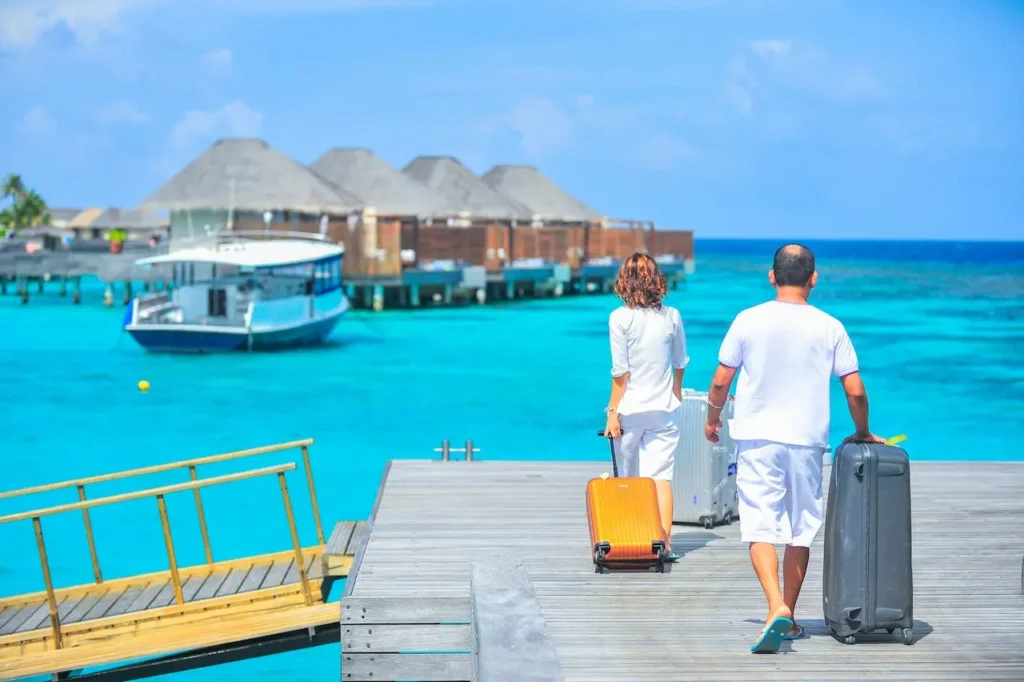
What to Do if You’re Injured On Vacation
Vacations are the best way to unwind: Every moment is dedicated to connection, relaxation, or heart-pounding adventure. However, if you've ever been injured on vacation, you know how quickly things can change from soothing to stressful.
Whether it's a slip and fall down the resort stairs, a scooter accident on the streets of Bali, or any other mishap, knowing what steps to take if you're injured on vacation is crucial for your well-being and potential legal considerations. Plus, it might just give you some peace of mind when you’re taking off for your next journey.

Table of Contents
How to Handle Getting Injured On Vacation
Experiencing an injury while on vacation can be distressing, but taking prompt and informed steps can make a significant difference. Let's review what you can do to proactively protect yourself if you're ever injured on vacation.
1. Prioritize Your Health and Safety
If you're injured on vacation, the most important thing is your immediate health and safety. Get out of the way of any oncoming traffic, and reach out for medical attention promptly, either by calling emergency services or visiting the nearest hospital or urgent care facility. Remember that in most places leaving the scene of an accident is a criminal offense unless it is absolutely necessary to get help or medical assistance.
It's crucial to address injuries as soon as possible to address any injuries ASAP, and to be sure you can build a strong personal injury case should you want to in the future.
2. Report the Incident
Contact the local authorities to report the incident. If your injury occurred in a hotel, resort, or any other establishment, inform the management and ask for a written incident report. This report will serve as crucial documentation should you need to pursue a legal claim later.
3. Document the Scene and Gather Information
Collect as much information as possible about the incident. Take photographs of the accident scene, your injuries, and any other contributing factors. If there were any witnesses, see if they might provide you with their statements and contact information. Documenting the details can significantly strengthen your case if legal action becomes necessary.
4. Keep All Relevant Documentation
Hold onto all documents related to your injury. That includes medical records, prescriptions, and receipts for any expenses incurred due to the incident. This paperwork will be essential when seeking compensation for medical bills or other damages.
5. Notify Your Travel Insurance Provider
If you have travel insurance, notify your provider as soon as possible. They can guide you through the necessary steps for filing a claim, which often involves getting documentation such as medical reports, receipts, and other relevant evidence. If the incident involves a medical emergency, your provider can also help find healthcare facilities and local medical professionals.
Travel insurance typically covers a range of scenarios, including medical expenses, costs related to trip cancellations or interruptions, and additional unforeseen expenses. That extra peace of mind can make all the difference, allowing you to focus on your well-being. Check with your insurance provider to see if you have international coverage or what you should do if you get injured on vacation.
6. Consult with a Personal Injury Attorney
If the injury was caused by the negligence of another party, consulting with a personal injury attorney should be a priority. An attorney can evaluate the circumstances of your case, provide legal advice, and guide you through the process of pursuing a legal claim against the responsible party.
7. Understand Local Laws
Be aware of the local laws and regulations in the area where the incident occurred. Legal processes and statutes of limitations can vary, and understanding the local legal landscape will help you make informed decisions about your course of action.
8. Notify Your Home Country's Embassy or Consulate
Being injured on vacation in a foreign country adds another level of uncertainty. If you're injured abroad, you must contact your home country's embassy or consulate. These diplomatic offices are equipped to offer crucial support, whether that’s information about available local medical facilities or guidance on legal resources and navigating unfamiliar legal systems.
The embassy or consulate staff can also help connect you with reliable healthcare services in the region. In situations involving legal complexities arising from the injury, such as liability issues or local legal proceedings, these diplomatic offices can offer guidance and connect you with legal resources or professionals who can provide expert advice.
Click here to view the list of U.S. Embassies, Consulates, Diplomatic Missions, and offices providing consular services.
9. Maintain Communication with Relevant Parties
Stay in communication with all relevant parties, including your attorney, insurance provider, and any medical professionals involved in your care. Open and timely communication ensures that everyone is on the same page, making the process smoother and more effective. If you get injured on vacation, contact friends and family to let them know of the incident and how that may affect travel plans.
Frequently Asked Questions: What to Do if You're Injured On Vacation
What to do if you get sick while abroad?
If you get sick while traveling, it’s best to get immediate medical attention if the symptoms are severe or long-lasting. If you have travel insurance, inform your travel insurance provider who can walk you through your coverage and claim procedures. It’s also a good idea to let the staff or management of your hotel or homestay know about your situation.
In some cases, you may need to contact your embassy or consulate if you require assistance, and maintain documentation of medical treatment for insurance purposes.
Milder illnesses might not require you to go these lengths, though. If you find yourself with a cold on vacation, for instance, you may just need a few days rest, plenty of water, and a trip to a local pharmacy to get you feeling better again.
Do I need travel insurance?
Whether or not you need travel insurance depends on your comfort level, the trip you’re taking, the activities you’ve got planned, your budget, and the state of your health.
If your travel involves major expenses or long-haul trips to international destinations, travel insurance can offer financial protection for unexpected events like trip cancellations or medical emergencies. This is particularly true for those who have pre-existing medical conditions or have any particularly adventurous days lined up. Specific coverage for these scenarios might be a good idea.
Consider your risk tolerance and financial capacity to absorb unforeseen expenses, as travel insurance provides a safety net and peace of mind. That includes your existing insurance coverage, especially in terms of health and credit card benefits, to identify any gaps that travel insurance can fill.
Ultimately, while not mandatory for every trip, travel insurance can be a wise investment for those looking for a safety net on their next great adventure.
What does travel insurance cover?
Travel insurance is designed to provide financial protection and assistance in various situations that might disrupt or impact your trip. Before you go on your trip, contact your health insurance provider to see if there are any restrictions or what would happen if you do get injured on vacation. While coverage varies from policy to policy, here’s a breakdown of some of the things travel insurance typically covers:
- Trip Cancellation or Interruption: Travel insurance can reimburse you for non-refundable trip expenses if you need to cancel or cut short your journey due to covered reasons, such as illness, injury, or unforeseen events like natural disasters.
- Emergency Medical Expenses: If you require medical treatment during your trip, travel insurance can cover the costs, including hospital stays, doctor visits, and medications. This is particularly important when traveling internationally, where healthcare costs can be high.
- Evacuation and Repatriation: In the event of a medical emergency, travel insurance can cover the costs of emergency evacuation to the nearest appropriate medical facility and, if necessary, repatriation to your home country.
- Trip Delay or Cancellation: Coverage extends to delays caused by factors like severe weather or transportation issues. Travel insurance can provide compensation for additional expenses incurred due to these delays, such as accommodation and meals.
- Lost or Delayed Baggage: If your baggage is lost, stolen, or delayed, travel insurance can cover the costs of replacing essential items or reimburse you for the loss.
- Travel Document Loss: If you lose important travel documents like your passport or visa, travel insurance may cover the costs associated with obtaining replacements.
- Emergency Assistance Services: Many travel insurance policies include 24/7 emergency assistance services. These services can help with medical referrals, legal assistance, or providing information in case of an emergency.
- Coverage for Adventure Activities: Some travel insurance plans offer coverage for adventure sports and activities, addressing the risks associated with these pursuits.
Keep in mind that while these are common aspects covered by travel insurance, policies may differ, and there may be limitations or conditions that apply. Coverage may vary based on the type of policy you choose, such as single-trip, multi-trip, or specialty plans for specific needs like business travel or adventure trips.
Who should I contact if I am injured on vacation?
If you sustain an injury while on vacation, the first point of contact should be local emergency services in that area. Before you travel anywhere, you should make note of the emergency number in that area, so you can have it on hand in the event of an emergency.
If you are staying in accommodations, inform the staff about the situation—they can provide support and guidance. Additionally, contact your travel insurance provider as soon as possible to report the incident and seek guidance on coverage for medical expenses and other related costs. If you're injured on vacation in another country, you'll also need to contact your country's embassy.
Staying in communication with family or friends back home is also important to keep them informed about your situation. If the injury is severe or involves legal considerations, it may even be necessary to reach out to your country's embassy or consulate.
Does PIP insurance coverage extend to other countries?
Personal Injury Protection, known as PIP insurance, generally does not cover individuals outside of their home country. PIP is a form of auto insurance that provides coverage for medical expenses, lost wages, and other related costs in the event of an auto accident, but its scope is typically limited to the country or region specified in the policy.
When traveling abroad, it's crucial to check the terms and conditions of your insurance policy and consider purchasing additional coverage, such as travel insurance with medical benefits. This ensures you have adequate protection in case of unexpected accidents or injuries while in another country, as PIP alone may not extend its coverage beyond your home country's borders. Always consult with your insurance provider to understand the specifics of your policy and explore options for international coverage if needed.

Final Word: What to Do if You're Injured On Vacation
Nothing ruins a vacation vibe like an illness or injury, but in many cases taking the right steps can make this experience more manageable. Prioritize your health, document the incident thoroughly, and seek professional guidance with a personal injury attorney to navigate the complexities of pursuing compensation for an incident abroad.
If you're injured on vacation, contact our personal injury lawyers as soon as possible. Though we are based in North Carolina, Van Camp, Meacham & Newman has helped clients across the United States with their personal injury cases. If you’ve been injured on vacation and want to speak with an experienced lawyer, you can schedule your free 30-minute legal consultation with Van Camp, Meacham & Newman either online or by calling 910-295-2525.
Disclaimer: The information seen on this website, including the article above, is not legal advice or legal counsel. If you wish to speak to a personal injury attorney, contact our North Carolina attorneys directly using our online form or by calling 910-295-2525. While our law firm is located in North Carolina, our attorneys have tried cases and work with clients across the country, from Raleigh, Fayetteville, Pinehurst, and Sanford, to Virginia, Illinois, Oregon, and California to Florida. Call our experienced lawyers today.

